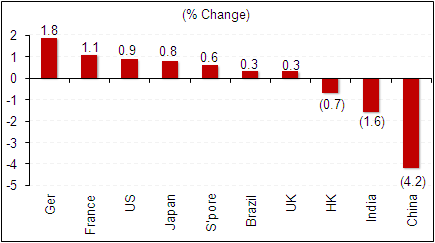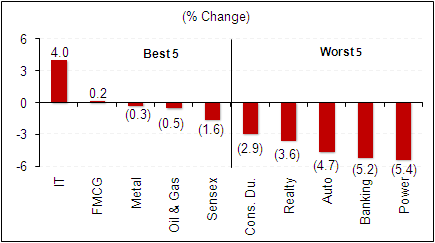India's Third Giant Leap
This Could be One of the Biggest Opportunities for Investors
- Home
- Todays Market
- Indian Stock Market News February 7, 2015
Western markets outperform Sat, 7 Feb RoundUp
In the week gone by, stock markets of the developed world continued their upward journey on the back of central banks in Europe and Japan following the path of aggressive monetary easing measures to revive their respective economies. The German DAX and the French CAC indices were the top gainers in the week.Crude oil prices rebounded sharply this week but it's anyone's guess if the rally can be sustained. The US markets remain positive. However, the markets are increasingly worried about the US Fed increasing policy rates in the middle of this year due to improving economic data.
Back home, the Indian markets ended lower on the back of disappointing quarterly earnings and the Reserve Bank of India (RBI) maintaining status quo on the repo rate in its monetary policy review. The RBI though did cut the SLR by 0.5%. The Indian central bank stated that further rate action will be dependent on economic data.
 |
| Source: Yahoo Finance |
Apart from IT stocks, all sectoral indices witnessed selling pressure this week. Power and banking stocks registered the maximum losses.
 |
| Source: BSE |
Now let us discuss some of the key economic and industry developments in the week gone by.
As per a leading financial daily, the government may prod state-run banks to raise Tier II capital through the sale of bonds to the public. This move is aimed at deepening the corporate bond market through increased retail participation. Currently PSU banks use the qualified institutional placements (QIP) route to raise Tier II capital that are easier but do not have retail participation. Tier II capital consists of certain reserves and subordinated debt and is lower than Tier I capital that largely comprises of equity and accumulated losses. As per RBI estimates, public and private banks together require additional capital of Rs 5 trillion to comply with Basel III norms out of which Rs 1.75 trillion would be equity.
Seven Indian pharma companies have been recommended for suspension by the European Medicines Agency (EMA). The decision follows after questions were raised over the integrity of clinical research data generated at a site operated by Hyderabad-based GVK Biosciences. While the list of suspended medicines comprise the names of several major global generic drug makers, including Teva and Mylan, at least a dozen drugs marketed by Indian companies and their subsidiaries have also been figured in this list.
As per news reports, in the upcoming budget scheduled on 28th February, the government is planning to scrap dividend distribution tax (DDT) altogether. Currently, DDT is in the range of 15-17% and is paid by corporates. Earlier dividends were taxed in the hands of shareholders. If DDT is scrapped, corporates would stand to benefit and shall be inclined to dole out their surplus cash as dividends rather than hoard the same for tax reasons. This shall also boost investor sentiment but impact the revenue targets of the government. If DDT is indeed scrapped government will have to look out for alternative ways to boost its revenues.
| Company | 30-Jan-14 | 6-Feb-14 | Change | 52-wk High/Low | |
| Top gainers during the week (BSE-A Group) | |||||
| Future Retail | 117 | 139 | 18.9% | 152/77 | |
| UPL | 368 | 429 | 16.5% | 436/177 | |
| Bhusan Steel | 83 | 92 | 10.3% | 470/82 | |
| HCL Tech | 1,794 | 1,955 | 9.0% | 1997/1257 | |
| Nalco | 45 | 49 | 8.8% | 69/32 | |
| Top losers during the week (BSE-A Group) | |||||
| Crompton Greaves | 190 | 159 | -16.1% | 231/117 | |
| JSW Energy | 121 | 102 | -15.4% | 126/43 | |
| Indian Overseas Bank | 57 | 50 | -12.5% | 90/44 | |
| Century Textiles | 575 | 506 | -12.0% | 651/287 | |
| Apollo Tyres | 242 | 213 | -12.0% | 249/111 | |
Now let us move on to some of the key corporate developments of the week gone by.
According to a leading financial daily, the government is willing to consider and allow SAIL to sell excess iron ore in the open market to make it available for small steel producers. This would help the small steelmaking units which are affected from the lack of iron core supplies in the country. Reportedly, SAIL mines would be able to produce 50 mtpa from a current level of 28 mtpa. Also, SAIL is seemingly planning on investing Rs 100 bn in the expansion of mines. Also, the company has decided to ramp up capacity of Rourkela Steel Plant (RSP) to 10.8 m tonne (mt) by 2025 from the current capacity of 4.5 mt. The expansion would be completed in two phases. RSP more than doubled its hot metal capacity from a level of 2 mt to 4.5 mt after the commencement of country's second biggest Blast furnace 'Durga' in August 2013.
Coal India, is planning to form joint ventures (JVs) with the Indian Railways and other private companies for various rail projects. Reportedly, the company is looking at revenue based partnerships to add approx 50 projects in the country that can help in alleviating the congestion of coal movement. The company and the railways are working towards various such models, to develop lucrative joint ventures. In other news, the company had reported an output of 46.60 m tonnes (MT) in January, missing its target by 6.9% for the month. The company's output target for January was 50.09 MT. The company also missed its output target of 403.56 MT for the first 10 months of the current fiscal and produced 388.98 MT of coal during the April-January period. The two-day strike by workers last month affected its daily output by almost half of the total production
The proposed merger of Sun Pharma and Ranbaxy has come one step closer after the US Federal Trade Commission (FTC) has completed the review of the said acquisition and has granted early termination of the waiting period. The early termination of the waiting period under the Hart-Scott-Rodino Improvements Act is an important condition for the closing of the Ranbaxy acquisition. Under the consent agreement accepted by FTC, Sun Pharma and Ranbaxy will have to divest the latter's interests in generic monocycline tablets and capsules to an external third party.
Let us now take a look at some of the quarterly results that were announced this week.
Tata Motors reported disappointing numbers. The company's consolidated profit declined by a fourth, mainly due to one-time provisions. As for the standalone business, the same reported a net loss of Rs 21 bn as compared to profit of about Rs 13 bn last year. Losses included a one-time provision of Rs 3 bn for the Singur plant, as well as another Rs 3 bn exceptional item which included inventory write offs amongst others. Consolidated revenues rose by 10% YoY, largely due to higher volumes and a change in product mix. Revenues of the M&HCV sales were up by 43% YoY, while LCV sales fell by about 9% YoY. The passenger vehicle segment grew by 5% YoY in line with the industry growth. Going forward, the company expects to remain in investment mode, which is why the management stated that cash flows in the coming year are expected to be in the negative zone.
India's largest cement firm ACC announced results for the third quarter and nine months ended December 2014. On a consolidated basis, the company's sales grew by a mere 1.6% YoY. Further, the company's operating income was impacted by the sharp rise in the manufacturing and freight costs. This led to drop in the EBITDA margins to 9.3% v/s 13.5% last year. However, the profits were up by 18.3% YoY, on the back of tax credit availed for the quarter. The company has recommended a final dividend of Rs 19 per share.
Leading FMCG firm Dabur posted 16.4% YoY increase in consolidated net profit at Rs 2.8 bn for the quarter ended December 31 2014, even as passive demand continued to impact the sector. The company had posted a net profit of Rs 2.4 bn in the same period of the previous year. Its consolidated net sales in third quarter of current fiscal grew by 9.2% at Rs 20.7 bn, as against Rs 19 bn in the year-ago period. Its smaller vertical retail business and other segments grew by 33.5% YoY to Rs 256 m and 33.6% YoY to Rs 372 m respectively.
Going ahead, the Indian markets will continue to look for cues from global events as well as the results season which will draw to a close next week. However, investors would be best served if they focus on the long term and invest only in fundamentally strong companies trading at attractive valuations.
For information on how to pick stocks that have the potential to deliver big returns, download our special report now!
Read the latest Market Commentary


Equitymaster requests your view! Post a comment on "Western markets outperform". Click here!
Comments are moderated by Equitymaster, in accordance with the Terms of Use, and may not appear
on this article until they have been reviewed and deemed appropriate for posting.
In the meantime, you may want to share this article with your friends!